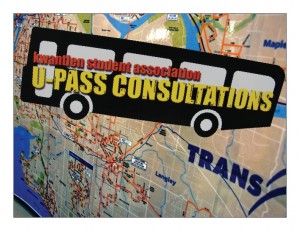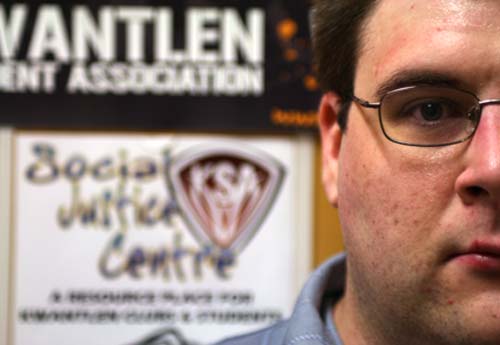Magazine’s $40,000 will endow journalism program
November 16, 2009 by Kirk Darbyshire · Leave a Comment
Some Kwantlen journalism students will be provided financial assistance in the form of a $40,000 endowment from a local magazine.
Mehfil Magazine, a popular Indo-Canadian lifestyle publication, has established the endowment because its publisher feels it’s important to support good journalism since it plays an important role.
Rana Vig, Mahfil’s co-publisher, hopes that by being the first Indo-Canadian publication in B.C. to establish an endowment of this size he’ll convince others will follow suit and support a high level of professional journalism in the community. Vig feels the university has been a leader when it comes to engaging the communities it serves, including the Indo-Canadian community.
The magazine, which was established in 1993, focuses on events in the Indo-Canadian community in the Lower Mainland. It’s also a source for features on people, lifestyles and fashion, as well as commentary on issues related to today’s Indo-Canadian
“We are very grateful for Mehfil’s support of our students,†said Robert Adamoski, Kwantlen’s social science dean.
The Kwantlen journalism program, which recently left the faculty of design and communications for its new home in the faculty of social sciences, has existed for more than 25 years. It offers students both four-year Bachelor of Journalism degrees and two-year diplomas.
Adamoski feels the Kwantlen program provides journalism students a strong understanding of the industry and prepares them for careers in multimedia journalism on graduation.
The endowment will provide annual funds for journalism students, according to journalism coordinator Beverley Sinclair. Sinclair feels this money could go a long way towards easing the financial burden university tuition and books puts on students.
“It amazes me how few students actually apply for scholarships,†said Sinclair, who recalls a previous student who almost completely paid for her tuition by applying for and receiving scholarships that are available every year to students.
Richmond KSA gives campus bathrooms a failing grade
November 13, 2009 by Justin Langille · 1 Comment

Richmond Kwantlen Student Association council director Reena Bali wants to know who hasn’t been pulling their weight in the washrooms around Kwantlen’s Richmond campus.
In Bali’s Nov.3 council report, buried beneath plans for pool tournaments and club nights, is a frank statement, condemning the conditions of most washrooms on the Richmond campus as “just horrible!â€
Many of the washrooms, especially one for women located near the Blossoming Lotus yoga studio around the corner from the KSA Richmond campus offices, is often found in an unclean state, said Bali.
She isn’t that isn’t sure about the state of washrooms for male students.
Bali said that she thinks what she says are unsanitary conditions shouldn’t be blamed on campus cleaning staff, but on inept students.
“It’s, like, the people who use it,†Bali said. “I guess they don’t know how to use a washroom properly.â€
The state of the washrooms is problem that Bali has noticed since January.
“If someone is using a washroom, they should practice proper hygiene,†said Bali. “Cleaning staff can’t come to the washroom after every 10 minutes, because they have all other things to do, too.â€
Bali feels that, other than the washrooms, Richmond is a pretty clean campus. She plans to talk to KSA chairperson Steve Lee and the university to see if she can solve the problem.
Kwantlen’s janitorial services are contracted out to Dynamic Facility Services Ltd, according to a July 22 bid aware notice written by Christine Monroe, manager of supply contracts for Kwantlen’s supply and business services division, and published on Kwantlen’s website.
Dynamic’s bid for the annual day porter and core cleaning services contract is valued at $473,024 and was accepted on the basis of a best-value criteria.
Sam Mann, facilities supervisor at Kwantlen’s Richmond campus, said that the conditions of washrooms varies from campus to campus, and that poor conditions are often due to vandalism.
“Most kids do respect the facility I believe, but it’s just that the odd person tends to (vandalize),†Mann said.
“I guess some people… could be having a bad day…could be frustrated…some people, I guess it’s just their nature to do that kind of stuff.
KSA rolling papers a doob-ious affair
November 5, 2009 by Jacob Zinn · Leave a Comment

The KSA sells cigarette papers, but don't intend them to be used solely for tobacco. (Jacob Zinn photo)
The Kwantlen Student Association maintains that selling Zig-Zags (paper used to roll tobacco cigarettes and joints) does not conflict with the university promoting anti-smoking products under the student health plan.
Though selling cigarette paper seems to contradict a recent on-campus anti-smoking event, the KSA said it has to provide items for both smokers and non-smokers.
“If people want to smoke medical marijuana, they can,†said Nathan Griffiths, KSA Director of Operations. “If they want to quit smoking tobacco, we’ve provided products to try and have them stop.â€
Griffiths said he doesn’t feel the paper sales are hypocritical in light of the anti-smoking products.
“Currently, we also offer insulin on our health plan, but we still sell Coke, other junk food within the cafe, so I don’t see much of a difference,†said Griffiths.
The concerns of inconsistency on the subject came up during initial KSA talks about supplying Zig-Zag rolling papers.
“We discussed this when we started doing the rolling papers,†said John O’Brian of the Cloverdale KSA. “It was a plebiscite about the legalization of marijuana and it was sort of a close margin.â€
O’Brian said he thought the school would never sell rolling papers, but student demand prompted the sale of Zig-Zags. In the October 2003 plebiscite, out of 784 students who voted, 470 supported the decriminalization of marijuana.
The papers were introduced to the Cloverdale campus in March of this year and then at other campuses.
The separation of Zig-Zag papers from anti-smoking products comes from the concept of not using the cigarette paper to roll cigarettes.
“We don’t intend for them to be used to smoke tobacco,†said O’Brian.
The KSA hasn’t taken a stance on the decriminalization of marijuana, but it does support medical marijuana. Those who smoke marijuana recreationally are not restricted from buying Zig-Zags.
Dr. Balbir Gurm of Kwantlen’s nursing program said she understands the KSA has to support services for smokers, but hopes it doesn’t send mixed messages.
“I think what they have to do is keep the message clear that yes, we want to support people who want to quit smoking, but we can’t turn our backs on those of our members to choose to smoke,†said Gurm.
The sales haven’t really caught on; to date, Cloverdale has sold 32 packs and Surrey has sold 25, with 100 papers to a pack. The Richmond campus hasn’t sold many Zig-Zags and sales at the Langley campus have been discontinued after none were sold.
Because sales have been slow, original plans to add the KSA logo to the papers have been scrapped.
“We were testing to see if they were going to be popular enough,†said O’Brian, who added that even if the papers sold well, a local printing company no longer puts logos on cigarette papers.
KSA may not need H1N1 vaccine in student health plan (updated)
November 2, 2009 by Jacob Zinn · 2 Comments

Jared Busse has been sick twice in the last four months and tested negative for H1N1 both times. (Jacob Zinn photo)
The Kwantlen Student Association likely won’t have to cover the cost of the H1N1 vaccine for students under its health and dental plan.
The student association originally wanted to include the vaccine in the health plan and subsidize some or all of the cost, but the federal, provincial and territorial governments might pay for vaccinations for students.
“At this stage, it looks like they may be offered for free by the province,†said Desmond Rodenbour, general manger of the KSA. “However, if there is a charge, we’re going to make sure they’re covered under the health and dental plan.â€
The Public Health Agency of Canada has said the federal government will cover 60 per cent of the cost, leaving provincial and territorial governments to cover the difference if they choose.
Although the university provides seasonal flu shots, they will not have H1N1 vaccines on campus, according to Janine Hadfield of the Kwantlen Wellness Centre.
“It’s going to be totally regulated by Public Health,†said Hadfield. “The roll-out starts with [people with] chronic illness and pregnant women, then it goes to young under six and further down the road it’s for the everyday person.â€
Hadfield noted that health regions in the Lower Mainland may distribute the vaccine differently.
Currently, the vaccine is only available to specific groups, such as pregnant women and adults under 65 with chronic illnesses. Vancouver Coastal Health and Fraser Health is planning to make the H1N1 shot available to everyone in mid-November.
Thomas Ewing, 21, a business student at Kwantlen, is skeptical about the benefits of the H1N1 vaccine.
“I’m not a conspiracy theorist, but I’m kind of wondering why the vaccine’s being pushed out on everybody,†said Ewing. “The H1N1 [vaccine] is still too untested for my liking.â€
Jared Busse, 19, also a business student, said he feels the dangers of H1N1 have been blown out of proportion.
“It’s just an overhyped cold just ‘cause it’s new and they don’t know how to deal with it,†he said.
KSA may not need H1N1 vaccine in student health plan
November 1, 2009 by Jacob Zinn · Leave a Comment
The Kwantlen Student Association likely won’t have to cover the cost of the H1N1 vaccine for students under its health and dental plan.
The student association originally wanted to include the vaccine in the health plan and subsidize some or all of the cost, but the federal, provincial and territorial governments might pay for vaccinations for students.
“At this stage, it looks like they may be offered for free by the province,†said Desmond Rodenbour, general manger of the KSA. “However, if there is a charge, we’re going to make sure they’re covered under the health and dental plan.â€
The Public Health Agency of Canada has said the federal government will cover 60 per cent of the cost, leaving provincial and territorial governments to cover the difference if they choose.
Although the university provides seasonal flu shots, they will not have H1N1 vaccines on campus, according to Janine Hadfield of the Kwantlen Wellness Centre.
“It’s going to be totally regulated by Public Health,†said Hadfield. “The roll-out starts with [people with] chronic illness and pregnant women, then it goes to young under six and further down the road it’s for the everyday person.â€
Hadfield noted that health regions in the Lower Mainland may distribute the vaccine differently.
Currently, the vaccine is only available to specific groups, such as pregnant women and adults under 65 with chronic illnesses.
Vancouver Coastal Health and Fraser Health is planning to make the H1N1 shot available to everyone in mid-November.
KSA collecting students’ thoughts on U-Pass
October 29, 2009 by Kyle Vinoly · 5 Comments

This week a series of U-Pass consultations wrapped up on the Richmond campus. The KSA will return to Richmond next week for another round, eventually concluding in Cloverdale and Langley. (Kyle Vinoy photo)
The Kwantlen Student Association has been touring Kwantlen campuses hosting U-Pass consultations designed to give the KSA a better idea of improvements students would like to see made to transit in order to ease their commute, and to gauge the level of support for a U-Pass.
“We want to make sure that commuting between campuses isn’t the reason students don’t take a course,” said Derek Robertson, director of external affairs.
This week’s series wrapped up yesterday at the Richmond campus, with a return scheduled for next Tuesday afternoon at 2:15 pm in room 1420. Consultations has concluded at the Surrey and Langley campuses, with consultations at Cloverdale scheduled for next week.
At each sessions students are given an 11-page survey which explores their current transit use and improvements they’d like to see Translink make to its service. Robertson said that improving the current level of transit availability and frequency for the Cloverdale and Langley campuses is crucial to the KSA accepting any form of the U-Pass. He also wants to see more recognition payed to Kwantlen by renaming the Landsdowe station on the Canada Line to include the school’s name.
Robertson does not support a $25 U-Pass being pushed by OnePassNow as he feels supporting it would mean Kwantlen students would subsidize students at other colleges, such as Emily Carr and VCC-Clark. He said that those two schools combined have roughly 10,000 students and Kwantlen has 15,000 and that difference would equal an unfair price tag for Kwantlen students. He said that Kwantlen students could hope for a pass costing between $25 to $30 without partnering with other universities.
After all the data from the consultations is complied, Robertson plans to meet with Translink and the provincial government and come to an agreement. He will be in Ottawa next month to present the data and hopes to arrange a meeting with federal transport minister John Baird.
Robertson’s goal is to hold a referendum on the U-Pass in the KSA general election this spring.
Where have all the computers gone?
October 26, 2009 by Kristi Jut · 1 Comment
When Kwantlen journalism students came back to school in September, 26 four-year-old Apple computers had been replaced in their lab, as well as six in a production rooms reserved specifically for students in the program.
Students didn’t only want to know why the computers had been replaced, they wanted to know where the old computers went, and whether they could get their hands on them.
The answer is maybe.
Juilien Phillips, Graphic Design and Marketing systems supervisor, who worked closely with the Journalism program, told The Chronicle that all of the university’s computers need to be upgraded to newer versions every four years. “[The older computers] would not be able to manage the software we put on them [this year],” he added.
Some computers get distributed throughout the university, where even older versions need upgrades, and the other are put into storage.
That’s where Scott Gowen,, Kwantlen’s Director of Supply and Business Service, comes in. When the computers are put into storage, Gowen is notified. He then liaises between Kwantlen’s IET Department and the B.C. Government’s Asset Investment Recovery (AIR).
Because Kwantlen has a policy that prevents sale of surplus equipment to faculty, staff and students, the unneeded computers have to go to B.C. AIR, or are donated to Afretech, Gowen said. Afretech is an organization based in Delta that was started by two Kwantlen instructors. Its purpose is to collect surplus supplies from places that no longer needed them, including Kwantlen, and donate them to schools in rural Africa.
Gowen is letting students in on a little secret.
“This November ,another shipment of Mac computers will be sent to B.C. AIR where they will be available for purchase by any member of the public, including Kwantlen employees and students,” he wrote.
The company, which deals with a cash-and-carry program as well as online-auctioning, is offering a “special back-to-school deal on laptops and computers.” The surplus equipment is available at B.C. AIR warehouses (located in Surrey, Victoria, and Prince George) or through their online auctions.
Information on cash and carry sales and auctions are available at the B.C. AIR website.
Kwantlen on B.C.’s Top 55 Employers list again
October 26, 2009 by Kirk Darbyshire · Leave a Comment
Kwantlen Polytechnic University has again been chosen one of British Columbia’s top 55 employers for 2010.
“This is a testament to all those who worked hard not only for the students, but also on behalf of their colleagues,†wrote David Atkinson, president and vice-vhancellor of Kwantlen, in an online announcement.
The annual competition is in its sixth year, and is organized by the editors of Canada’s Top 100 Employers. This is the third time Kwantlen has been selected on the list.
The competition is open to employers of any size, as long as their head office or principle place of business is in BC. Employers in both the private and public sectors are eligible.
The competition looks at the same eight criteria used by its national counterpart:
- physical workplace
- work and social atmosphere
- health, financial and family benefits
- vacation and time off
- employee communications
- performance management
- training and skills development
- community involvement
Kwantlen, which is one of four universities on the 2010 list, was selected for its work in many areas. The university was recognized for new mothers maternity leave top-up benefits to 75 per cent of their salary for 52 weeks. Kwantlen also pays parental leave top-up benefits to 75 per cent for 37 weeks for new fathers or adoptive parents. Both exceed what employment insurance entitles workers to.
Another criteria that sets the university apart was vacation and time off. Kwantlen gives all new employees three weeks of paid vacation time during their first year on the job.
The university also helps employees balance work and personal lives through a variety of alternative work arrangements. Examples include telecommuting, which means employees enjoy flexibility in working location and work hours, and giving employees a 35-hour work week, with full pay and full company-paid health benefits.
Liaison quits KSA over social justice spending decision
October 20, 2009 by Mitch Thompson · 4 Comments

Ken McIntyre has resigned as a student liaison after a KSA decision over an referendum-approved charge for a Social Justice fund. (Mitch Thompson photo)
Student liaison Ken McIntyre has resigned from his position on the Kwantlen Student Association council to protest the handling of a referendum-approved 10-cents-a-credit fee to fund the Social Justice Centre.
McIntyre, who had been the liaison to the KSA for students with disabilities, one of seven positions that focus on social justice issues at the university, resigned Oct. 6 after the KSA voted to remove the 10-cent-a-credit fee from Social Justice and increase the KSA’s building fee from 25 cents a credit to 35 cents.
The social justice fee was approved in the September referendum and would have been used to fund the liaisons and their Social Justice Centre, rather than having their budget come from KSA operating funds.
Derek Robertson, director of external affairs, made the motion to remove the Social Justice fee and increase the student union building fee instead.
“His rationale was that we still had a budget for the previous year, even though it was taken out of the KSA operating expenses,†said McIntyre.
Because of the KSA’s self-imposed student-fee-increase limit of 15 per cent (or $1.56 for next year) a year, the KSA council would be unable to introduce the social justice fee as well as raise the building fee.
McIntyre fears that removing the fee would mean there is no guarantee that social justice will receive adequate funding next year.
“Any other proposal that was put forward by myself or somebody else was, basically, swiftly voted down by [Robertson] and the council,†he said.
The motion was passed and McIntyre decided to leave the KSA in protest. “[Social justice is] more or less one of their bottom issues that they pay lip service to,†he said.
A representative for the KSA said priorizing played an important role in the choosing of which of the fees approved by students would be implemented.
“When we put these questions forward, we didn’t think they would all pass,†said Nathan Griffiths, director of operations.
All of the fees, save one CFS-related one, were passed, and the KSA was faced with the problem of deciding who receives money first while staying under the 15 per cent cap on student fee increases.
“Largely, more people voted for the student union building than people voted for social justice,†Griffiths said.
The referendum results released by the KSA show 58.5 per cent of voters were in favour of the student union building fee and 52.6 per cent of voters were in favour of the social justice fee.
One of the considerations for the KSA is the large mortgage on Surrey campus’s G-building.
The building — which currently houses the KSA, the gymnasium and Grassroots café, other facilities and classroomsz — was built in the 1990s. The provincial government had refused to pay for anything that wasn’t a classroom, so the KSA held a referendum and raised the $1.8 million dollars needed for the other rooms.
The KSA has been paying a sizable mortgage since, and needs to pay it off before it can begin constructing a new student union building.
“We’ve got to pay the mortgage,†said Griffiths. “I don’t think we’d look bad for paying the mortgage.â€
Robertson echoed Griffiths’ position, saying that he felt it would be better to pay off the mortgage more quickly, rather than having the 10 cents a credit go to social justice.
“This was not an attack on our liaisons. This was not an attack on social justice at Kwantlen,†he said. “The whole argument that the KSA is underfunding liaisons is just not true.â€
Robertson said that the KSA provides funding for social justice but sees little of that money being used. “Every single year, the KSA puts money towards the Social Justice Centre and liaisons, and every single year a majority of it is not spent,†he said.
For Griffiths, this is enough to make him reconsider sending more money to social justice. “More money doesn’t necessarily equal more social justice,†he said.
McIntyre explained the lack of spending is a result of the culture towards social justice within the student association. He said that the unused funds come from vacant liaison positions or are the result of provisions that state only a certain percentage of money can be spent at one time.
He also said that many liaisons don’t focus on large scale, high-expense events, as “the amount of money that’s available, with the lack of cooperation and manpower from the rest of the society, sometimes doesn’t make it worth doing.â€
According to McIntyre, indifference towards social justice extends past a lack of funding and into where the liaisons actually work.
The possibility of turning the Social Justice Centre into extra office space for KSA staff, and instead issuing liaisons low-end laptops on which to work, has been discussed among members. The belief was that since the liaisons are multi-campus positions, making their workplace mobile was a natural step.
McIntyre countered however, saying that the KSA executive are technically multi-campus positions as well, but receive both office space and laptops.
“It’s adding insult to injury, as far as I’m concerned,†he said.
“I still believe that the student association is good for the students at Kwantlen,†said McIntyre. “As far as social justice issues, I have lost faith in the student association to make any headway.â€
Robertson said that he will fight to make sure social justice gets the same funding as last year, but McIntyre wasn’t impressed.
“Guaranteeing funding for the amount of money we got last year is a good first step,†he said. “But, at the same time, if you take a look at other students unions, and what they have for social justice, it’s going to take more than just an empty promise.â€
KSA terms referendum results ‘historic’
October 20, 2009 by Sarah Jackson · 1 Comment
Twelve of the 13 items on this September’s referendum ballot were approved, a result that the Kwantlen Student Association, who planned the referendum, never foresaw.
Student fees will increase $1.56 per credit for the spring, summer and fall 2010 semesters to fund the creation of student union buildings, the START volunteer program, the REBOOT computer service, intramurals and clubs and events. This means that full-time students registering for 15 credits should expect their spring semester bill to be $23.40 higher.
The KSA plans to begin START, REBOOT and intramural programs in January and is discussing holding a referendum asking students for permission to raise student fees more than 15 per cent per year to hasten the introduction of other items that were approved.
“This is quite historic,†said Steven Lee, director of finance for the KSA. “The KSA wasn’t expecting all of [the referendum items] to pass. We wanted to see what students wanted us to do, so it was kind of a referendum slash opinion poll.â€
Fees collected for the student union fund will be put toward building planning and paying off the $1.6 million G-building mortgage from the 1990s, which was partially covered through the KSA’s reserve funds last year. The clubs and events fee will be used to offset current clubs and events spending, which totaled over $150,000 last year.
Less than half of one per cent of Kwantlen students voted: 494 ballots were cast, surpassing the 250-minimum required to make referendum results binding.
The turnout was “quite good for a referendum,†said Lee.
The Canadian Federation of Students fee increase, the only item that failed, will not affect Kwantlen’s CFS membership. The proposed increase was questioned by Shamus Reid, chairperson of the CFS-BC, as an amount he was not familiar with and something that would not normally appear on a referendum ballot.
“I don’t know where that number came from,†he said.
Desmond Rodenbour, general manager of the KSA, said that the CFS adjusts membership fees for inflation every year and that the KSA reached the $1.78 fee increase by calculating the CFS’ percentage increase.
After consulting the University Act and the College and Institute Act, the KSA determined that it has “no legal authority to increase student fees without a referendum,†said Rodenbour.
Lee believes the item failed because “the students that voted are already familiar with the KSA, so they know how the CFS has been treating the KSA.†Everything else passed because “we were able to get different people [campaigning] that were interested in different areas.â€


